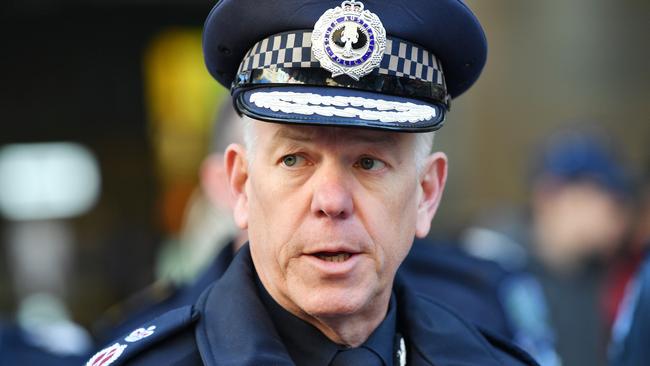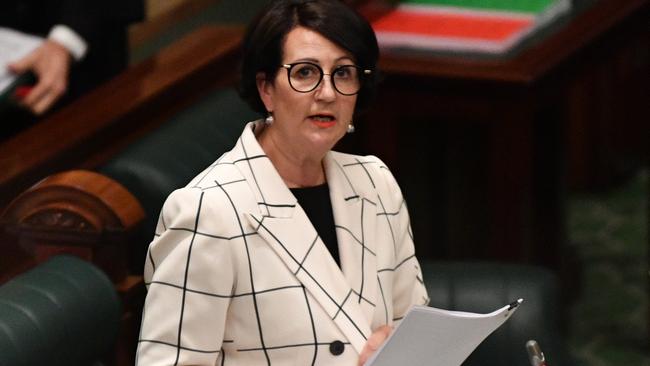Top cop’s warning on organised crime move on SA’s sex industry
In an extraordinary break in protocol, SA’s police commissioner has gone public with his fears over a boom in organised crime if the parliament decriminalises the sex industry without appropriate regulations.
- Ex-sex workers protest prostitution decriminalisation bill
- Stevens says prostitution legislation doesn’t meet safety needs
- News laws decriminalising prostitution unfair to sex workers
- Call for Hanson Rd exclusion zone if prostitution decriminalised
Police Commissioner Grant Stevens has warned that community safety “will be at risk’’ and organised crime will flourish in South Australia if legislation to decriminalise prostitution is introduced without regulations to restrict who can own and operate brothels.
In a blunt forecast, Mr Stevens has predicted an expansion of organised crime groups — including those from interstate — in SA’s sex industry.
He said that would jeopardise the wellbeing of both sex workers and the public.
Senior police have provided consistent advice to several parliamentary committees, as well as confidential written advice and briefings to MPs on the likely scenario.
However, Mr Stevens is concerned SA may end up with deficient legislation that will be exploited by criminals.
“We are very concerned the absence of regulation would create a significant opening for organised crime to enter the industry, to exploit the industry for the purposes of money laundering, sex trafficking, sexual exploitation and drug trafficking,’’ he said.
“We have no view about whether or not sex work should be decriminalised.
“We do not have a moral position that is influencing our advice. We simply assert that in a decriminalised or legalised sex work industry there must be a regulatory framework to ensure the people in that industry, and people who are affected by it, are protected.’’
A Greens private member’s Bill to decriminalise prostitution has passed the Upper House. It will be debated in the Lower House and face a conscience vote when parliament resumes next month.
While the legislation removes all offences relating to engaging in, soliciting or living off the proceeds of prostitution, it contains no measures to restrict who can own or operate a brothel.
Police want regulations identical to those used to restrict bikie gang members or members of declared criminal organisations from involvement in the tattoo industry, security industry and second-hand goods outlets attached to the prostitution Bill. This would include a fit and proper persons test.
Last month, the Sunday Mail revealed members of the Rebels and Finks bikie gangs were already positioning themselves to take advantage of the possible decriminalisation of the industry.

In a stark warning, Mr Stevens said, should the Bill be passed without any of the requested regulations, it would have a significant affect on SAPOL’s ability to control organised crime in SA.
“There will probably be a growth in organised crime activity in SA as well,’’ he said. “In the absence of a regulatory framework, I think it would be seen as ripe for exploitation by criminal entities.
“The resource implications are probably going to have implications for our fraud investigations, organised crime investigations, drug investigations and Crime Gangs Task Force operations.
“We may see an increase in illicit drug trafficking through the sex-work industry, and there could be instances of further harm to sex workers as a result of being exploited. We could see increased activity around sexual servitude and the exploitation of vulnerable people.’’
Mr Stevens said SAPOL had offered briefings to both sides or parliament to ensure its position was clear and to “make it perfectly clear’’ what the ramifications of an unregulated sex industry were.
“On the face of it, it appears when we brief different stakeholders there is due consideration to the advice we are providing,” he said.
“However, we still remain concerned there may be a move to decriminalise the sex work industry without any regulatory framework and that, for us I think, presents a risk to community safety.
“We will continue to make ourselves available. We are concerned about a Bill passing that does not contain a regulatory framework, so we are looking at how we can make sure our position is clearly understood so an informed decision is made as they move forward.’’
Mr Stevens said SAPOL did not have a view on potential brothel locations but he sympathised with people who might be affected by the establishment of one near their home or business.
“That is a brothel, then you have the issue of street workers and the risks associated with sex workers operating around schools, churches and in other places the general community congregate,’’ he said.
“I can safely assume there will be some opposition to that.
“If it is not regulated properly, there is also the risk people who are not sex workers are likely to be mistakenly approached, which I am sure people would find confronting and offensive.’’
He said over the past two years there had been more than 100 calls to Crime Stoppers concerning the location of brothels and associated activities, which had resulted in increased police activity.

Many had come from the operators of hotels and motels that Asian syndicates had been using as part of the sex trade.
Besides regulations to restrict who can own or operate a brothel, police also want other relevant government authorities to have the power to enter a brothel to ensure regulatory compliance. Under Section 32 of the Bill, police would only be able to enter a brothel if they suspected a crime had been committed or was about to be.
Mr Stevens said he wanted his officers to retain the ability to enter a brothel without this suspicion, to ensure the business was being operated by the appropriate individuals.
“It is not about targeting sex workers, it is about ensuring the people who are running the industry meet the probity requirements we place against a whole range of other sectors that are susceptible to organised crime infiltration,’’ he said.
“This is not about disrupting the industry, it is about providing a safe environment and to protect vulnerable people who are a part of the industry.
“This is to protect sex workers, clients and people who are affected by the presence of a brothel.’’
Mr Stevens urged MPs to consider the ramifications of passing the legislation in its current form, and to examine the regulatory frameworks put in place in other states that have decriminalised prostitution.
“They should consider this as they deliberate on the Bill and approach us for further clarification if there is any misunderstanding or questions they may have,’’ he said.
Attorney-General Vickie Chapman, who is sponsoring the Bill in the Lower House, has said she had discussed the Bill with Mr Stevens and would consider his concerns and those of others as the Bill progressed.
